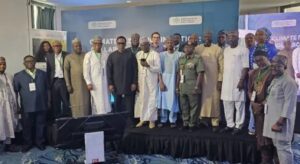 The African Agricultural Technology Foundation (AATF) has called for urgent and coordinated climate action to address the escalating vulnerabilities of agriculture in Africa, particularly among smallholder farmers, women, and youth-led micro, small, and medium enterprises (MSMEs). This appeal was made during the high-level conference titled “Climate Resilience in Action: Collaborative Approaches to Adaptation,” held on May 27, 2025, in Abuja. The event was co-hosted by AATF, Michigan State University (MSU), Sahel Consulting, with support from the Gates Foundation and the Government of Gombe State.
The African Agricultural Technology Foundation (AATF) has called for urgent and coordinated climate action to address the escalating vulnerabilities of agriculture in Africa, particularly among smallholder farmers, women, and youth-led micro, small, and medium enterprises (MSMEs). This appeal was made during the high-level conference titled “Climate Resilience in Action: Collaborative Approaches to Adaptation,” held on May 27, 2025, in Abuja. The event was co-hosted by AATF, Michigan State University (MSU), Sahel Consulting, with support from the Gates Foundation and the Government of Gombe State.
Key Highlights:
- Vulnerabilities of Smallholder Farmers: Dr. Kayode Sanni of AATF emphasized that smallholder farmers, who are heavily reliant on predictable seasons, fertile soil, and sustainable ecosystems, are increasingly affected by climate change. Women and youth, who constitute the backbone of Africa’s agricultural workforce, are disproportionately impacted.
- Collaborative Initiatives: AATF is involved in a project with MSU, the University of Nigeria, Nsukka, Benue State University, the Government of Gombe State, and the Cereal Growers Association of Kenya. This initiative empowers women- and youth-led MSMEs in the rice value chain by providing them with a Climate Smart Decision Support System, offering actionable data on weather, agronomic best practices, and soil health. Currently implemented in three Nigerian states, AATF advocates for scaling up such initiatives to enhance impact.
- Technological Advancements: Dr. Daniel Uyeh from MSU showcased the development of an open-source, affordable, and locally manufactured weather station system. These stations deliver hyper-local weather data, enabling farmers to make informed decisions and adapt to climate variability effectively.
- Call to Action: Dr. Sanni urged stakeholders to build enduring partnerships, replicate successful models, and equip farmers not just to survive climate change but to thrive amidst it.
The AATF’s call underscores the need for a collective and innovative approach to enhance agricultural resilience in Africa, ensuring food and nutritional security in the face of climate challenges.
Source: EnviroNews
